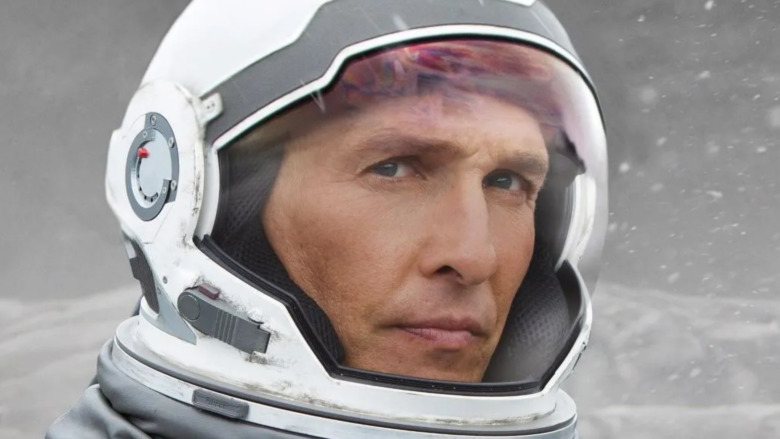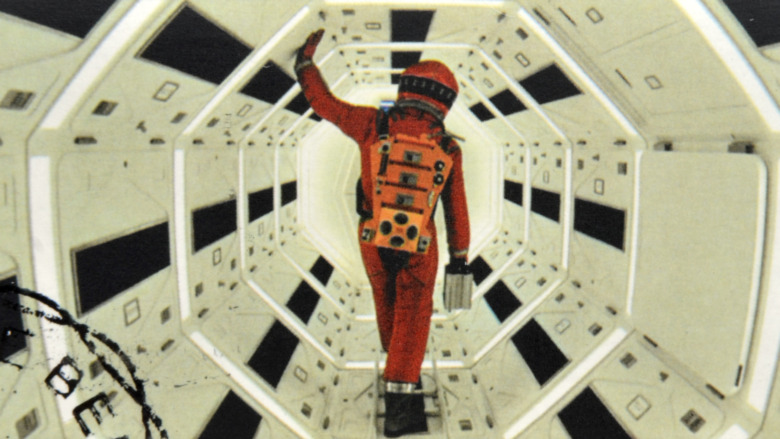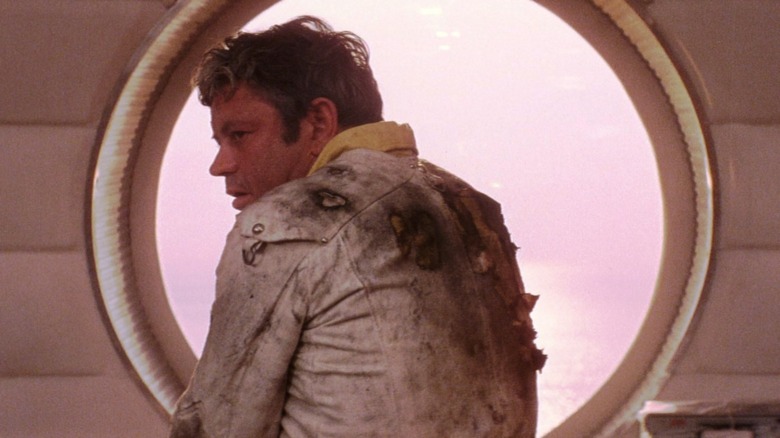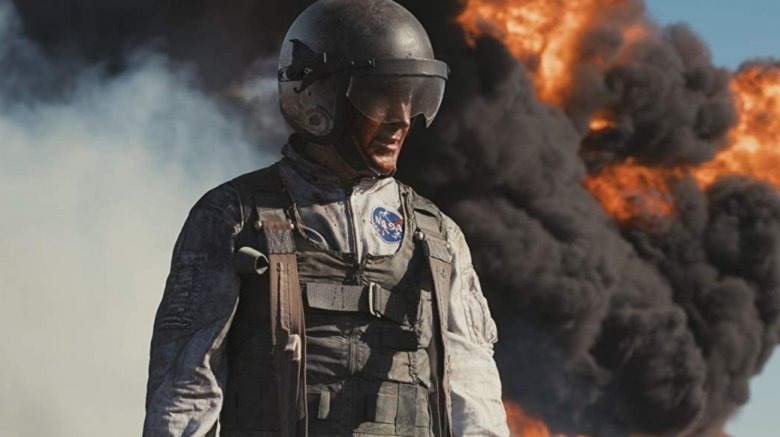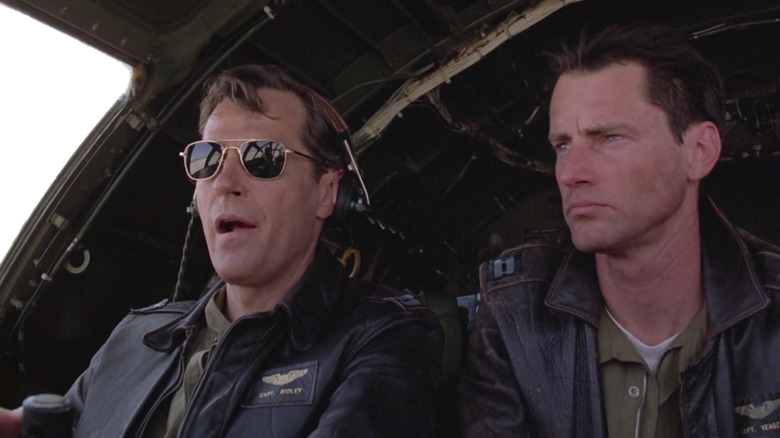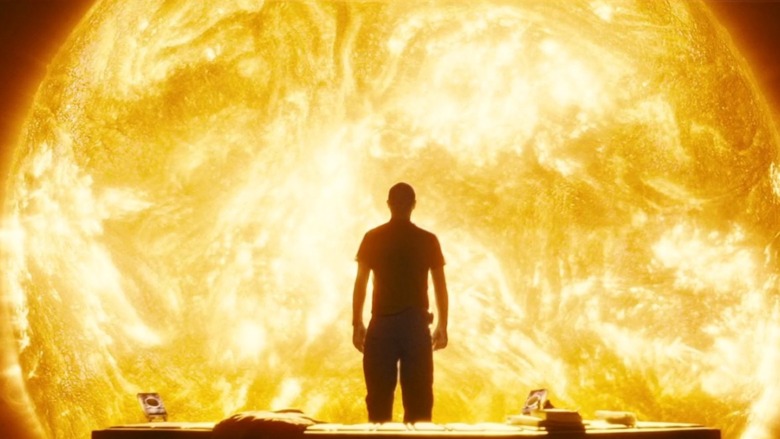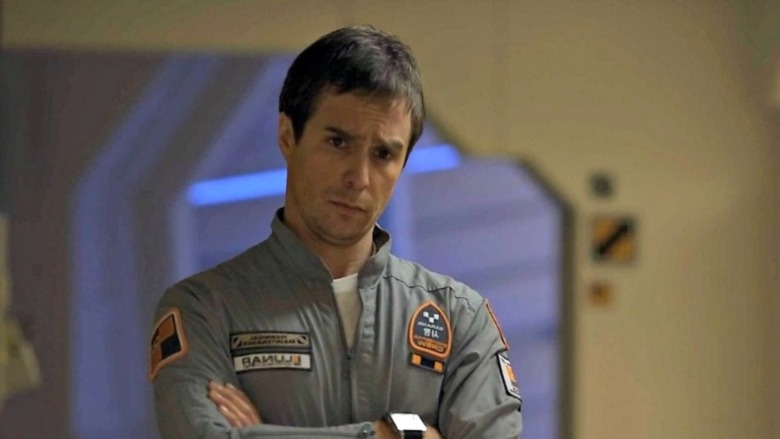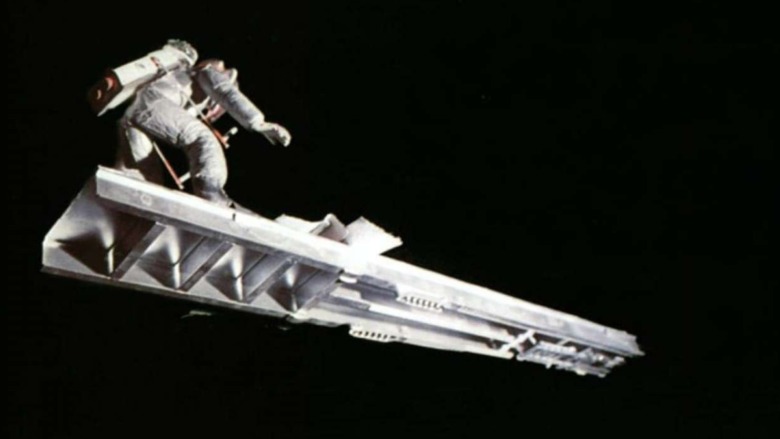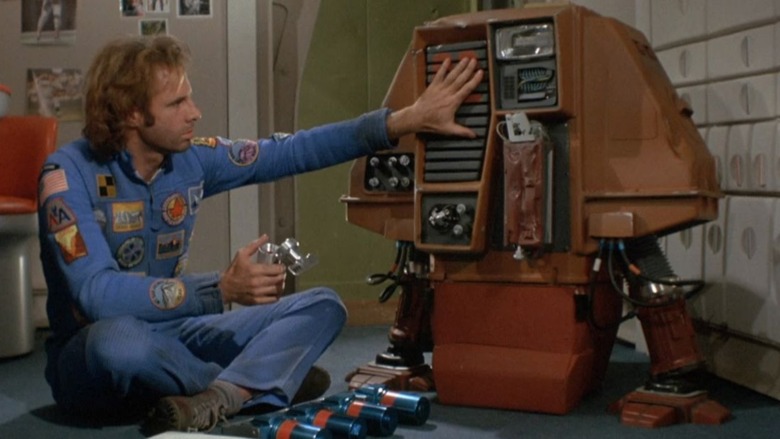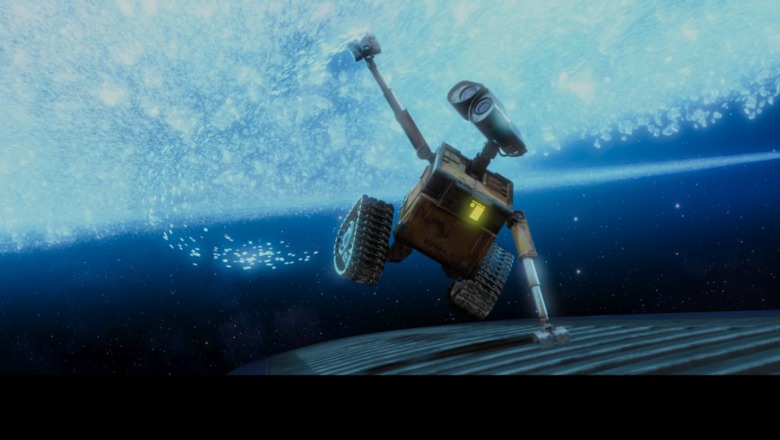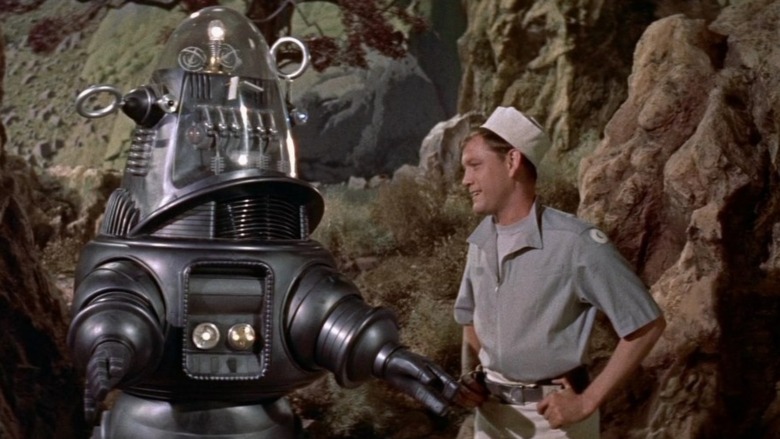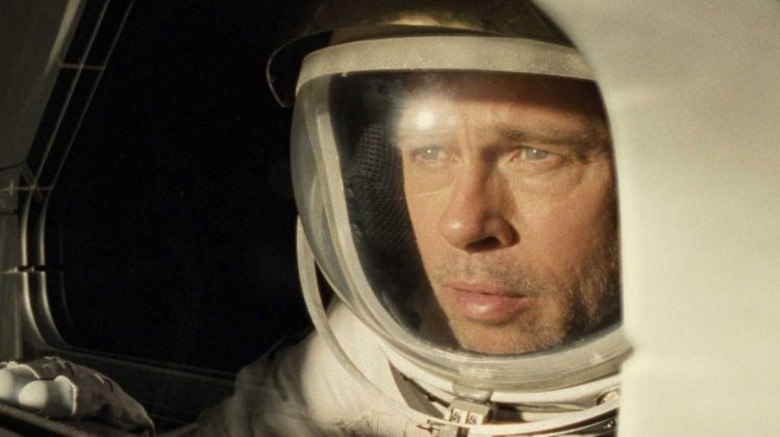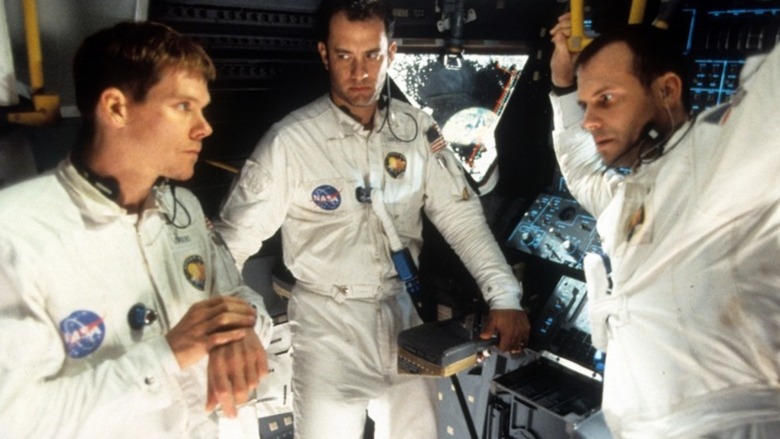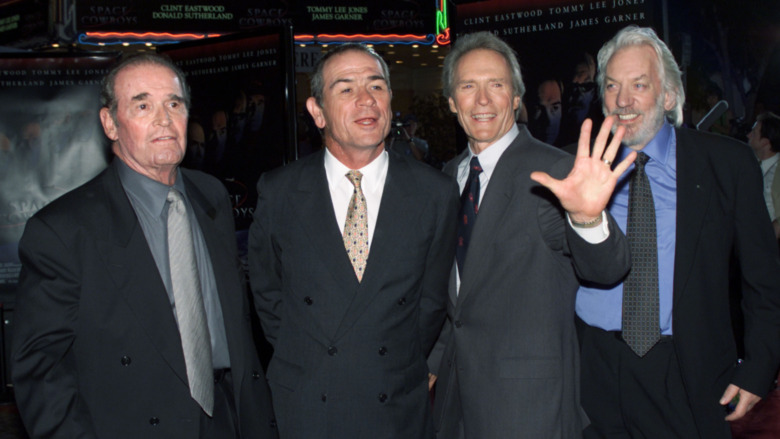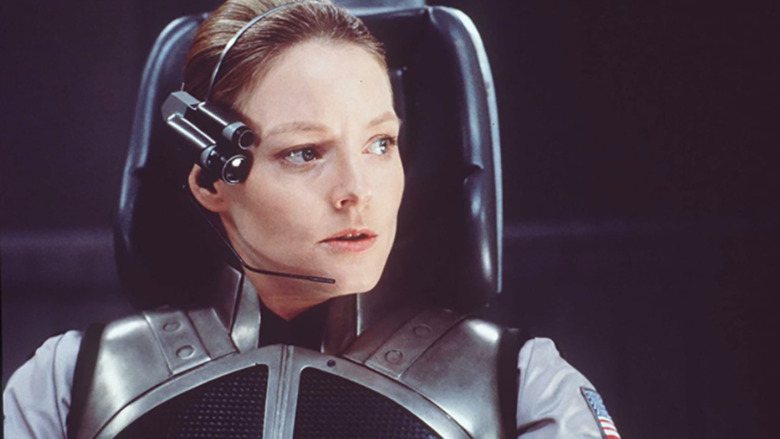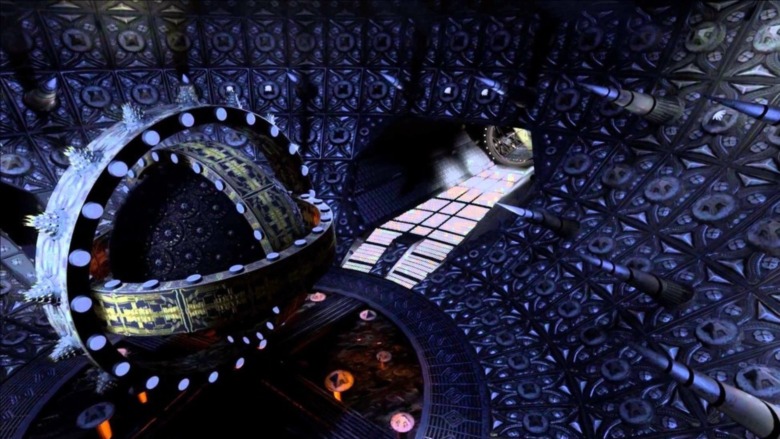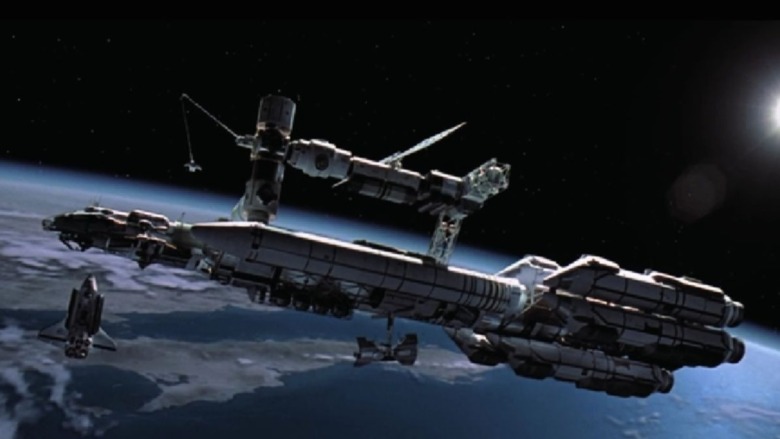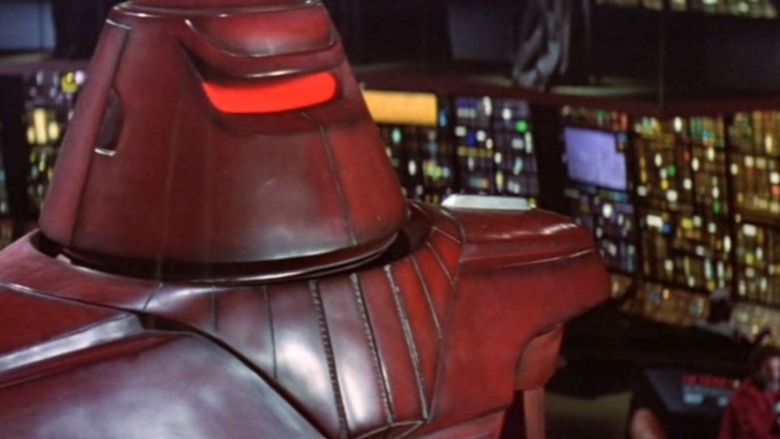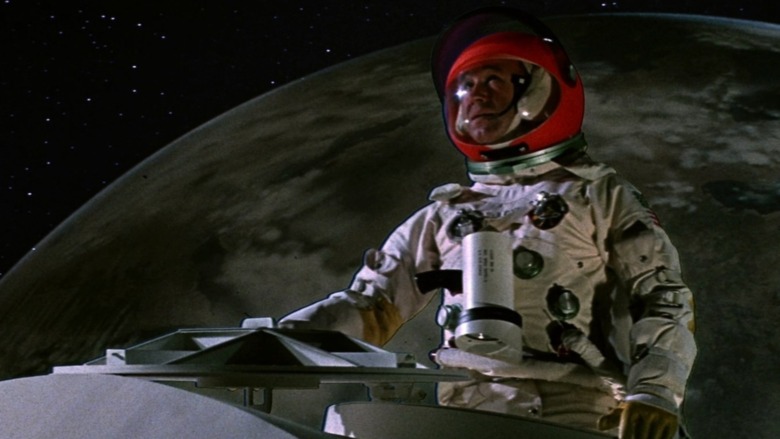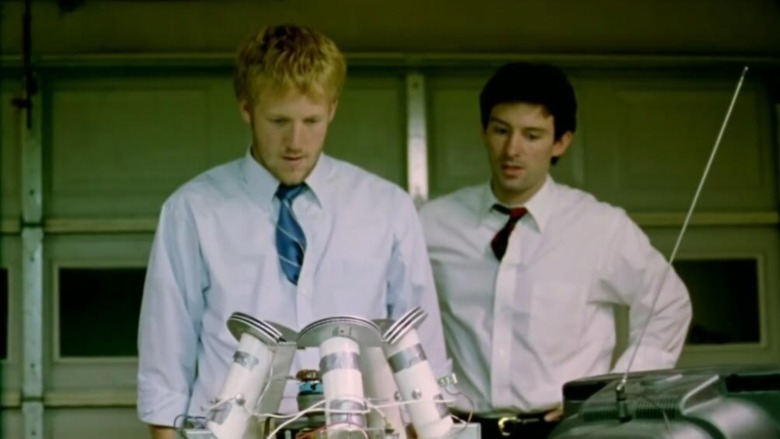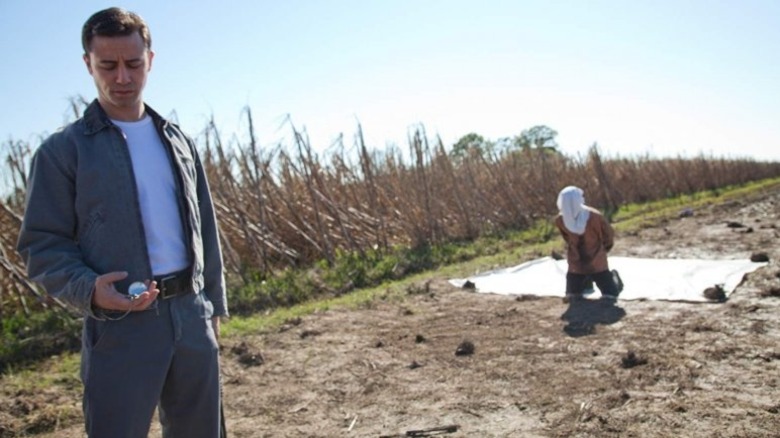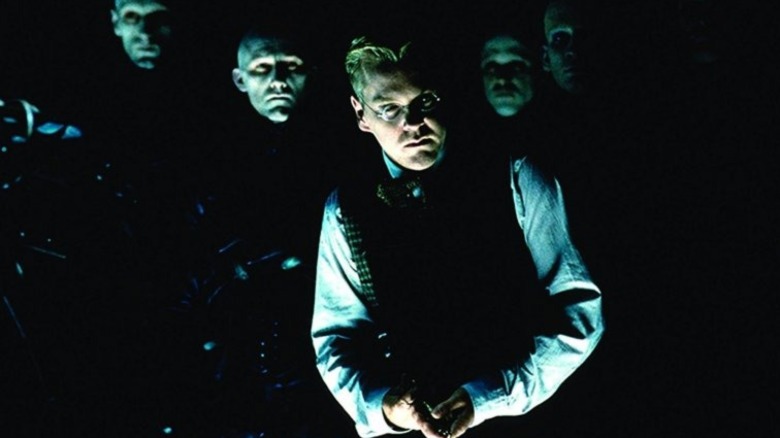21 Sci-Fi Movies Like Interstellar You Have To Watch
"Interstellar," Christopher Nolan's 2014 ode to space exploration, weaves together existential threats to humanity, familial trauma that travels through time, and some very important bookcases. It was galactically adored by critics and moviegoers alike. In fact, its initial worldwide release grossed more dollars than there are miles from the Earth to Jupiter: It raked in $677 million, dwarfing a distance of 601 million miles at the gas giant's farthest point.
However, in the years since the release of "Interstellar," big-budget sci-fi offerings have taken a back seat to tales of men and women in capes, beating the bejesus out of each other, robots, aliens, and the occasional wizard. Fans who still stan space-centric stories may, as a result, find themselves wanting in today's multiversal marketplace. Not to worry: We're here to help with a list of star-spanning sci-fi movies any fan of Nolan's "Interstellar" can enjoy. Let these films tide you over until the next flight-suit-clad release makes its box office debut.
2001: A Space Odyssey
In 1968, auteur Stanley Kubrick laid the foundation for every science fiction movie dealing with deep space exploration since with "2001: A Space Odyssey." Though the movie focuses on human interaction with alien beings at different stages of evolution, it is most remembered for its central conflict between man and machine. In this case, said conflict sparks between super AI and master chess player HAL and the astronauts aboard the ship HAL oversees.
HAL's monotone voice and devious lip reading abilities are likely the first things that come to mind when most people remember "2001." But the film's other attributes, including time warps, silent and clinically filmed spacewalks, and an ending encounter that can only be described as interdimensional, all serve as a Rosetta Stone for the language Nolan uses in "Interstellar." Both stories combine breathtaking imagery with dire space exploration to investigate humanity's progress, and how we might be coaxed to the next stage of evolution by beings from beyond. Nolan may not share Kubrick's detached and ironic sensibilities, but "Interstellar" would look a lot different in a world without "2001." It's not only essential viewing for "Interstellar" fans, it's essential viewing period.
Solaris
Following the success of "2001: A Space Odyssey," Russian director Andrei Tarkovsky won the Grand Jury Prize at the 1972 Cannes Film Festival for his "anti-'2001'" film, "Solaris." If "Interstellar" got its aesthetic from "2001," then it certainly got its heart from "Solaris." Tarkovsky set out to tell a high concept sci-fi story with stakes tethered to human emotion, particularly the lingering effects of grief and loss. His film follows a psychologist's investigation of a research station on the distant planet Solaris, and the odd psychic experiences of its skeleton crew. Eventually, the psychologist discovers Solaris projects recreations of the crew's lost loved ones, including his own dead wife.
Tarkovsky's unique vision, complete with his signature long takes, abstract storytelling, and focus on man's relationship with divinity, aren't echoed the same way Kubrick's visual flair is in "Interstellar." However, Nolan's argument that love transcends time, as well as his decision to use an enormous studio budget to film scenes like Joseph Cooper crying over missing his daughter growing up, all track back to Tarkovsky. "Solaris" is a heavy watch, and like "Interstellar," it asks the audience how far humans might go before exploring their own inner space.
First Man
Unlike other entries on the list, Damien Chazelle's "First Man" was filmed and released after "Interstellar." So, while it may not directly impact the style or story framing "Interstellar" uses, Chazelle's depiction of the trials and tribulations of real-life astronaut Neil Armstrong will appeal to fans fascinated by the inner workings of NASA and its pilots. The movie, starring Ryan Gosling as Neil Armstrong, follows Armstrong through his preparation for, and completion of, the first moon landing.
Chazelle centers the story around Armstrong's superhuman ability to perform under pressure — in a particularly intense of example of this trait, "First Man" vividly captures the fact that Armstrong was processing the death of his two-year old daughter during NASA training. Chazelle's decision to shoot the movie's various test flights and scenes set in space with practical effects further grounds the movie in Armstrong's personal experience. "First Man" won an Oscar for Best Visual Effects, and was praised by critics for putting audiences in "Armstrong's body and brainpan." For space junkies who love Nolan's visceral depiction of a man in a can hurtling through the universe's empty expanses, "First Man" is the movie for you.
The Right Stuff
"The Right Stuff" tells the story of the first men daring and crazy enough to attempt to fly into space. Based on acclaimed journalist Tom Wolfe's nonfiction book of the same name, the film follows the early days of the American space program, focusing on renowned test pilot Chuck Yeager and the Mercury Seven.
Following Wolfe's expertly-written book tinges the movie with lived-in detail: Everything from the pilots' regional slang to their raucous drinking habits are on display. Interestingly, by focusing on Chuck Yeager (Sam Shepard), the film veers into melancholy, as Yeager is not selected for the Mercury Seven due to his lack of college education and what authorities assume is not an attitude befitting of an astronaut. This choice is a brilliant one: In leaning into sadness, "The Right Stuff" encompasses the wide range of attitudes and characters that made space travel possible. While the movie is no sci-fi adventure, its consideration for the human element (the "spam in the can") of space travel will be interesting to any "Interstellar" fan.
Sunshine
Much like "Interstellar," 2007's "Sunshine" deals heavily in conceptual theories. In it, an international crew of astronauts sets out to drop a nuclear charge in the dying Sun, in a last-ditch effort to restart it. However, the severity of their mission begins to weigh on the crew, and things go awry.
"Sunshine" has a lot to offer "Interstellar" fans. It was written by Alex Garland, whose more recent directorial efforts, "Ex Machina" and "Annihilation," mark him as a truly unique voice in the genre, with a talent for digging into large and complex questions. Furthermore, it was directed by Danny Boyle, whose eye for unique visuals and kinetic direction is so strong, he was hired to design and produce the spectacular opening ceremony of the 2012 London Olympics. Combining the immense talents of Boyle and Garland delivers a sci-fi story that's a bit more mature than the average outing to save the world — one well in tune with larger questions "Interstellar" askes of its audience
Moon
2009's "Moon" is a lot of things. It's a film with a small release, that has since turned into a cult classic. It's a stage for an astonishing dual performance from Sam Rockwell, one of the greatest character actors of his generation. It's a mind-bending exploration of the perils of unchecked capitalism. Is it also a must-watch for any fan of Christopher Nolan's heady storylines? Absolutely.
"Moon," directed by Duncan Jones, tells the story of Rockwell's Sam Bell, a near-future energy worker who collects clean power from Earth's closest satellite. One day, on a routine mission in his moon rover, Sam suffers a near-fatal accident. When he eventually wakes up and recovers, things get ... weird. To say much more about the plot would truly spoil the fun of the movie, as its twisty tale leaves the audience guessing until the end. All in all, Jones' small-scale, melancholic, and sometimes (largely thanks to Rockwell) hilarious film does what most sci-fi flicks can only dream of doing: It makes the audience think about the present by telling a story from the future.
Dark Star
"Dark Star," John Carpenter's 1974 "Spaced Out Odyssey," sends up "2001" by mining the ins and outs of deep space missions for all the comedy they're worth. The 22nd century crew of the titular ship is on a 20 year mission to destroy unstable planets that may threaten future space colonization efforts with "Thermostellar Triggering Devices" — nuclear bombs that behave like Alexas, basically. While the plot may sound like standard sci-fi fare, the way Carpenter chooses to tell the story is anything but typical.
Carpenter leans into the comedy of the mundane to offer a funny argument about the future: Man may boldly go farther than he has gone before, but he's still just man. From the beginning, the crew is plagued by everyday problems of all sorts: The ship's captain was killed by faulty wiring, the supply of toilet paper went up in smoke when Storage Area 9 was destroyed, and a pet alien keeps breaking out of its room and making a mess. At first glance, "Dark Star" may not seem like necessary viewing for "Interstellar" fans, but for anyone who likes Nolan's introspection on what it means to be human and absurdist comedy, it's a must-watch.
Silent Running
In the 1970s, sci-fi turned its eye towards environmental issues. "Soylent Green" investigates murder in a world with dwindling resources, while "Fantastic Planet" asks what it would be like for humans to be treated like cattle. While both of these films are classics, the mother of all eco-minded sci-fi movies is unquestionably 1972's "Silent Running."
Starring the incomparable Bruce Dern, "Silent Running" portrays a future where life on Earth is extinct, and the last remnants of humanity travel the solar system in massive American Airline freighters. Dern plays Freeman Lowell, a botanist assigned to care for the geodesic dome containing the last of Earth's flora. When the freighters demand the domes be destroyed so they can return to commercial service, Lowell and his adorable robot companions, Huey, Dewey, and Louie, take it upon themselves to save the last of the trees.
This harsh portrayal of life after Earth is firmly rooted in a 1970s-typical "The humans really blew it" attitude. What makes the film stand out among its peers is its decision to focus on the humanity of its characters. Lowell is an intergalactic John Muir, and his friendship with his robots is not only believable, but heartwarming. For fans who love the dynamic between Cooper and TARS in "Interstellar," "Silent Running" is essential viewing.
Wall-E
"Wall-E" follows the adventures of a curious and kind trash-compacting robot who travels from an abandoned Earth to the intergalactic cruise liner containing the last of the human race. While "Wall-E" is animated, Pixar's team depicts space with utterly wondrous visuals quite a bit like the images Nolan creates in "Interstellar."
But "Wall-E" has more in common with "Interstellar" than amazing art direction: It also believes in humanity's ability to survive after giving in to their worst impulses. As a genre, environmentally-minded sci-fi tends to lean towards pessimism. The thinking seems to go that a portrayal of the worst future imaginable may scare the audience straight — or at least convince people to recycle. But in offering a depressing vision of the future, "Wall-E" chooses to tell a story in which a robot finds the means to convince humanity to give Earth another shot. It's the same sentimentality that propels "Interstellar," in which astronauts save the world through love.
Forbidden Planet
For fans drawn to the grand operatic beats in "Interstellar" — the drama between the crew, the companionship between the astronauts and the robots who serve them, the dangerous lengths a father will go to for his daughter — 1956's "Forbidden Planet" is a must-watch. Loosely based on "The Tempest," one of Shakespeare's final plays, "Planet" tells the story of a spaceship's trip to the planet Altair IV, to investigate the disappearance of the crew that previously arrived there.
In time, the crew's investigation delves into everything from monsters to mad scientists to ancient alien technology run awry. Beyond its wildly entertaining plot, "Planet" is also packed with iconic imagery: One could argue it invented how alien life and space exploration were portrayed on screen until Kubrick rewrote the rule book in the '60s. Plus, it stars a young Leslie Nielsen prior to his hilarious turns in "The Naked Gun" and "Airplane!" as Robby the Robot. Robby's whirling and bulky appearance, monotone voice, and willingness to serve make him one of the most memorable movie characters ever put to celluloid. All of this equates to a sci-fi picture that captured the public's imagination in the '50s just as "Interstellar" did upon its release in 2014.
Ad Astra
When "Ad Astra" was first released in 2019, cynical fans may have been quick to pan the movie as ripping off "Interstellar." However, director James Gray's finished product owes more to the great directors of previous generations, including Francis Ford Coppola and Werner Herzog. While "Ad Astra" does feature a gorgeous aesthetic and a bitter vision of the future that will appeal to anyone who liked "Interstellar," its more straightforward story offers up a viewing experience all its own.
The film stars Brad Pitt as Roy McBride, who sets out to find his father, H. Clifford McBride, who may or may not be alive on a space station in orbit around Neptune. What unfolds over the course of Roy's journey is closer to "Apocalypse Now" than "2001" in its shocking violence, exploration of human frailty, and climatic meeting between father and son. While the movie is smaller in scale than "Interstellar" — no aliens here, but there is a nasty encounter with baboons — its jaw-dropping visuals and focus on human frailty guarantee an intriguing watch for any Nolan devotee. Also, Tommy Lee Jones plays Pitt's estranged father, which is a selling point all its own.
Apollo 13
"Houston, we have a problem." This is a movie line so ingrained in the popular dialect, many of those who have it memorized likely have no idea where it comes from. If you're among this number, go sees Ron Howard's "Apollo 13" immediately. Based on the doomed 1970 NASA mission of the same name, "Apollo 13" encapsulates the trials and tribulations of real-life astronauts Jim Lovell, played by Tom Hanks, Jack Swigert, played by Kevin Bacon, and Fred Haise, played by Bill Paxton.
Ron Howard partnered with documentary filmmaker Al Reinert to ensure the movie was as true to life as possible. What results is a tense and inspiring look into what space travel is like for the brave few who break through Earth's atmosphere. Howard's commitment to nailing details — some of the movie's scenes were even filmed aboard NASA's infamous "vomit comet" plane — strands the viewer in the reality of three men who find themselves stuck very, very far from home. To "Interstellar" fans, we have just one thing to say: "Houston, we have a phenomenal movie to watch."
Space Cowboys
2000's "Space Cowboys" makes the impossible seem to be tantalizingly within reach. This film tells the story of four USAF pilots who train to go into space but never actually do, as their division is replaced by NASA. In their old age, they're called back into action to prevent a decaying Soviet satellite from falling out of orbit. While the movie is prefaced on a wild scenario, it wisely leans into the humanity of the aged astronauts' desperate desire to go to space. By the time the credits roll, their passion becomes the audience's passion, and it's not so hard to imagine why some people would risk it all for the stars.
All of this is, of course, enabled by the movie's phenomenal cast: Each member of the retiree crew is played by a legend. Any movie that boasts both Tommy Lee Jones and Clint Eastwood is worth checking out. Any movie that boasts those two and Donald Sutherland and James Garner rockets out of orbit into must-watch territory. The chemistry between the four men, particularly Eastwood and Jones, roots the narrative in believable friendship. This elevates the movie from hard-to-believe escapism into truly enjoyable adventure fare. Fans who walked into "Interstellar" hoping to experience the wonder of space will certainly be able to glean some of that same awe from these lovable space cowboys.
Contact
"Interstellar" is beloved for taking an original approach to a lot of pre-existing tropes of its genre. One of the most unique aspects of the film is the way Nolan presents our galactic neighbors. For anyone looking to enjoy another unusual approach to alien encounters, look no farther than 1997's "Contact."
Unlike many other sci-fi movies involving encounters with the third kind, "Contact" chooses to center its plot around the human reaction to the possibility of meeting aliens. This prospect is introduced when aliens send extraterrestrial investigators an instruction manual for a machine capable of transporting one human to a meet-and-greet in a far away galaxy. "Contact" focuses on the political hearings and religious questions that might ensue following such a proposition. Instead of diving into all the different ways aliens might dismember, disembowel, or disassemble humans for parts, it takes the audience through a whirlwind of bureaucracy and philosophical questions about what life somewhere else really means. There's not much else like it, and Nolanites are certain to love its thought-provoking questions.
Event Horizon
1997's "Event Horizon" offers horrifying new ideas about what may lie within the farthest reaches of spacetime. The film follows a rescue mission to the titular ship. Once the rescue team, consisting of sci-fi hall-of-famers Sam Neill and Laurence Fishburne, climbs aboard, they discover the ship traveled farther than anyone previously thought possible. In fact, the crew members begin to suspect the ship made it beyond our own dimension to one the religious might call Hell. Given the gruesome bodily violence the rescue team is subjected to, there's a strong case to be made they're correct.
Unlike "Interstellar," "Event Horizon" is not a life-affirming movie. However, its production is certainly as original as anything Nolan's team offers. The vessel's interior is particularly impressive: With its twisting corridors, bright lights, and phenomenally designed gravity drive centerpiece, it basically becomes its own character. Every scene aboard the ship is marvelous to behold ... until the halfway point, when it becomes pretty horrific to look at. Yet even those scenes have their own sort of grandeur. While "Event Horizon" may be a bit closer to B-movie horror than other films on this list, it's truly one-of-a-kind art direction places the film in the cinematic constellation "Interstellar" calls home.
Deep Impact
In 1998, two movies told the same story with wildly different outcomes: A comet so large it's capable of causing an extinction-level event heads for the Earth. One of these movies is Michael Bay's "Armageddon," which boasts an Aerosmith-heavy soundtrack, roughnecks, and Steve Buscemi as a hard-drinking conspiracy theorist. The other, a relatively quieter meditation on the importance of relationships in the face of the end of days, is "Deep Impact."
While director Mimi Leder's film doesn't have any real aesthetic similarities to "Interstellar," it does share that movie's love of the triumph of the human spirit. Christopher Nolan may not always get recognition for the sincerity he brings to his films, but scenes like the one in which the astronauts take off to the sounds of Dylan Thomas' "Do not go gentle into that good night" give his concern for emotion away. True to its title, "Deep Impact" does the same thing by exploring the experiences of abandonment, grief, and loss that erupt in the face of humanity's final hours. What results is a movie that earns the hope it leaves its audience with.
The Black Hole
Disney's 1979 film "The Black Hole" is a bit of an outlier to the rest of the Disney canon. It's genuinely scary at times, and its characters face threats like forced lobotomies that haven't appeared in Disney films before or since. However, for fans fascinated by the black hole at the climax of "Interstellar," Disney's foray into '70s Ridley Scott-style filmmaking is definitely worth checking out. The plot centers around astronauts who stumble across a ship they thought had disappeared decades ago, now precariously parked on the edge of the titular dying star. Upon entering it, they discover a mad scientist, his legion of creepy androids, and his aide-de-camp, the devilish robot Maximillian.
What unfolds over the course of the movie's run time is a slow descent into a nightmare. There's an ever-creeping sensation that something's just not right about the old ship and its robot crew. Our heroes' need to figure out just what exactly is going on keeps the audience engaged, while discussions about the black hole and what may lie beyond guarantee any sci-fi fan who starts watching will need to get to the ending.
Marooned
For fans drawn to the relentlessly tense set pieces and general sense of excitement of "Interstellar," look no further than John Sturges' 1969 classic, "Marooned." Sturges' filmography reads like a royal flush of classic movie poker: He directed "The Great Escape," "The Magnificent Seven," and "Gunfight at the O.K. Corral," to name a few. His movies, like Nolan's own catalogue, were all major releases in their day, featuring large, A-list casts, — Sturges worked with the King of Cool, Steve McQueen, twice — and very distinctive scores and themes.
While "Marooned" doesn't offer the emotional depth of "Interstellar," its story, centered around efforts to retrieve stranded astronauts, does offer similar thrills. Its cast, like Sturges' other films, is stacked with silver screen legends like Gene Hackman and Gregory Peck. From performances to pacing, this movie delivers some serious titillation and suspense. Nolan wove the influence of many better-known space-faring films into "Interstellar," but Sturges' impact is apparent when Nolan goes for broke on sweaty-palmed suspense.
Primer
Given Nolan's unfettered access to big studio budgets, fans may be surprised to find a thrifty indie movie on this list. However, 2004's "Primer" is so heavy on the theoretical "sci" and so light on the "fi" that some first-time viewers may mistake the film for some of Nolan's early work. In dazzling and dizzying fashion, "Primer" explores the sort of time-bending shenanigans that are fundamental to not only "Interstellar," but also "Memento," the movie that put Nolan on the map.
Watching "Primer" feels like attending a college seminar on philosophy and, simultaneously, a jargon-heavy tech trade show. The film explores what happens when two engineer friends invent a time machine. This may make it sound like a run-of-the-mill time travel movie, but it's anything but business as usual. Director Shane Carruth doesn't take his characters on an H.G. Wells-style adventure to time unknown: Instead, his protagonists move back in time to invest in mutual funds they know will increase, and openly discuss the possible paradoxes and loopholes they've created in their own timeline. For those enamored of the dedicated discussions on time's relativity and the effects thereof in "Interstellar," watching "Primer" presents an opportunity to hang out with two guys who feel the same way.
Looper
For sci-fi fans who like their time-traveling storylines served up with a side of strong fight choreography, Rian Johnson's 2012 thriller "Looper" will surely be their cup of tea. "Looper" depicts a future where criminal organizations send targets back in time to be assassinated by professional killers called loopers. One such futuristic employee is content in his work, until his future self is dropped in the past to be executed. His hesitation kicks off a chain of events that ripples through the past, future, and present.
While literally more grounded than "Interstellar," as "Looper" takes place entirely on Earth, the movie asks similar questions about humans' relationship with time. Where "Interstellar" considers how time impacts relationships between people, "Looper" explores how time impacts individuals themselves. So, while the movies greatly differ in subject matter, their themes act as reflections of one another. In fact, both movies climax with a single act of love moving through time.
Dark City
For "Interstellar" fans who loved the film's originality and memorable visuals, Alex Proyas' "Dark City" is a fantastic watch. This film tells the story of John Murdoch, who, in true noir fashion, awakens with amnesia in a bathtub, accused of a murder he did not commit. During his efforts to discover who he is and clear his name, John discovers that nothing is what it seems within the titular dark city.
Proyas' singular vision is a major cult hit, and it's not hard to understand why. He combines genres and aesthetics from entirely different decades (especially German Expressionism and film noir) to tell a story that leaves the audience guessing at every turn. Much like "Interstellar," "Dark City" gives its audience something truly new. For anyone desiring something fresh, seek out "Dark City." Admittedly, initial screenings may leave some viewers feeling like Cooper flying into the black hole, not knowing what to expect. But, just like Cooper, they'll find something truly fantastic on the other side.
